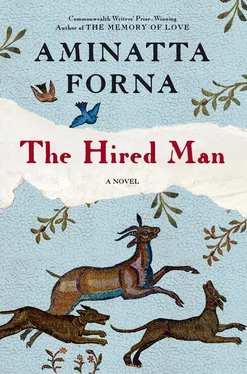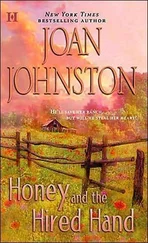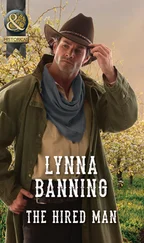‘Thank you, Matthew,’ I said.
Out of the tail of my eye I saw Laura appear at the back door, where she hesitated, paused for a moment and turned away. Matthew continued, ‘Yeah, well like I said, when Grace told us. ’ He lost the thread. ‘What was her name?’
‘Kos,’ I replied.
Matthew leaned across the table and patted me heavily on the shoulder. It was kind of Matthew, who hardly ever thought about anyone but himself. He sat back down, shaking his head as if making sense of the tragedy.
Later, with Laura, I discussed the height of the boundary hedge and which branches of the trees I planned to take down. After the moment when she’d turned away from the back door she’d eventually come into the house and behaved much as she was doing now. Her hands flew, her smile shone and her eyes slid over me. At lunch I helped Laura open a jar of pickled vegetables, for which she thanked me too many times. She offered me every item of food on the table separately, as if she was nervous, not of me going hungry but of leaving a gap in the conversation, into which something else might possibly slip. It didn’t matter to me especially, you understand. That Kos was dead was a matter of fact, which couldn’t be changed. I might even have thought Laura was trying to spare my feelings, if it wasn’t for the way she avoided my eye as though pain was a disease she could catch.
Late in the day I went up to the hills with Zeka, spent too long up there and by the time I was coming down it was nearly dark, I was just below the lower tree line, not far from the place I’d first seen Laura’s car drive into Gost. Just a little further on there is a view of the blue house and as it came into sight I thought I saw the figure of a man standing behind it, under the walnut tree and beyond the hawthorn hedge which I’d trimmed earlier that day. Now that the hedge was lowered you would have had a view to the back of the house, which I guess was why the man was standing there. My eyesight is good even in poor light, as I’ve told you many times, but now it was late and very nearly completely dark. I couldn’t be sure. I stopped, waited and watched, keeping the figure in view and waiting for any shift or movement, and sure enough it came. There was somebody there and he had just lit a cigarette, taken the packet out of his jacket pocket, shaken it and put one in his mouth and then lit it. I had not much more than a view of his profile and a white smudge of face, lit by the flare of the flame. He wore a pale jacket and dark trousers or jeans and stood smoking and looking into the back of the house, into the kitchen where I supposed the family was gathered to eat their supper. Upstairs a light went on and the man lifted his head towards the window on the upper floor. The light went off again and he went back to watching the kitchen window. He stood with his legs apart and one hand in his pocket, like a man on a street corner in any city in the world, casually lifting the cigarette to his lips and lowering it, watching passers-by as if he had every right to be there, not even bothering to look around or behind him. He might even have been waiting for the right moment to go and knock on the door, perhaps after he’d finished his cigarette. Or at least he would have if it wasn’t for the fact he was standing in a field behind a hedge at the back of the house and not out front. The way he’d positioned himself was interesting: half hidden but in such a way as to suggest he didn’t care whether or not he was seen.
From where I stood I couldn’t see whether or not a car was parked anywhere near by. I moved closer, swinging back a little the way I’d come so that I approached from behind. The fact is I’d recognised him more or less at once, certainly by the time he lit his cigarette. Now he flicked the butt away with a gesture that was completely familiar. It wasn’t Krešimir, who I’d also have recognised from his height and the slight curve of his shoulders. This man was stockier, heavier and a smoker, pale jacket and jeans. The jacket was made of butter-coloured suede and the car, wherever it was, would be a BMW. The man standing outside the blue house was Fabjan.
At a distance of one hundred metres I gave Zeka a silent command to lie down and to stay. At a distance of fifty metres I stopped and waited. Fabjan hadn’t heard me, but as I say, everything in his manner said he didn’t care if he was seen, in fact I’d go further and say it was almost as though he wanted to be seen, by the occupants of the house at least. He lit another cigarette, I watched him. He smoked it down, flicked the stub with his thumb and forefinger so it flew, a malignant yellow firefly, over the hedge and into the yard of the blue house. In all he smoked three cigarettes. He never turned. After the final cigarette he walked down the side of the house, where the ladder is. After a short while I heard a car engine and then a few seconds later came the headlights and the BMW drove past the blue house.
I called Zeka and went up to the hawthorn hedge, to where Fabjan had been standing and where, on the other side of the hedge, an ember glowed in the matted grass. For a minute I stood where he had stood, watching Laura, Grace and Matthew where they sat at table over the remains of a meal: a new Laura, with shorter, dark hair, a fringe and sun-tanned skin, a sweater over her shoulders, playing with the melting wax of a candle, her profile lit by its flame.
Sixteen years ago we endured months of candlelight. When it was finally over and we could turn the lights on, some of us were already used to the dark but for others nothing less than one hundred watts would do. I’ve heard that over at the hotel the passing tourists complain about the lighting in their rooms, in the foyer, but most of all in the restaurant. They say it’s too bright, they want something called ambience. The tourists can’t understand and nobody wants to explain, so they lie and say that people here like to see their food.
Some people start to return to Gost, others leave. Javor’s mother makes the journey north to have her operation. Javor puts her on the bus, which is packed with people. The family who owned the baker’s shop up sticks and are gone. The shop is closed, the hatch through which they used to sell devrek and meat pies is sealed. Yesterday’s bread still sits on the shelves at the back. Soon it is no longer yesterday’s bread but three-day-old bread, last week’s bread. There’s no explanation, no note on the door, just an old notice in faded black felt tip stuck to the door which asks customers to make their orders for the next day by ten o’clock. Somebody crosses out the word hleb and writes kruh . Both of the words mean bread, but some people use one and some the other. The ones who start leaving are the hlebs . So now there is only one baker’s shop in town. This inconveniences everybody, and yet it’s also the way we want it. In the closed shop the bread behind the counter turns blue. I know the family, everyone does: the two daughters: the Mongol the boys at school used to follow and grunt at and the slutty one in the angora sweater. I’d often been to their house, my father and theirs were always lending and borrowing things. Also the father used to supervise karate practice at the sports club, which I went to for a short while because my father thought it would do me good. In their front room they had a round rug, deep red colours, with a Persian-style pattern. I remember it well because I used to sit and stare at my feet and the pattern, embarrassed by the presence of the Mongol, while the red-haired mother offered me day-old pastries from the shop and the father went to search for whatever he was returning or giving.
So when I see a woman and a man, whom I also know, walking down the road with the very same rug on their shoulders, I know exactly from where it has come. The man strides forward and nods briskly at me but doesn’t speak and looks me right in the eye for a beat longer than anyone would normally. Behind him the woman, his wife, who is still wearing her slippers (they are the kind with a small heel), totters under the weight of the thing. She gives me a sheepish grin, lowers her head and scuttles on. The husband’s boldness stays with me for a long time. A pair of middle-aged thieves, challenging me to challenge them.
Читать дальше












